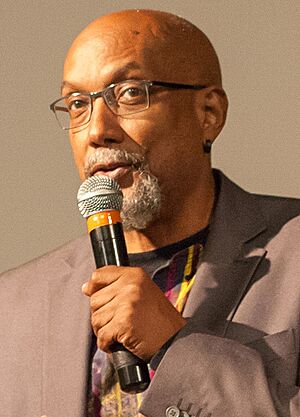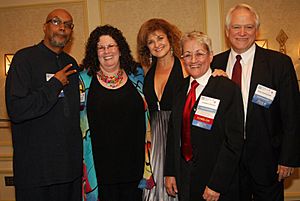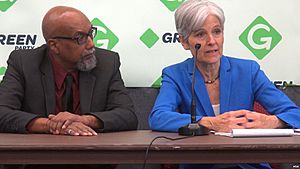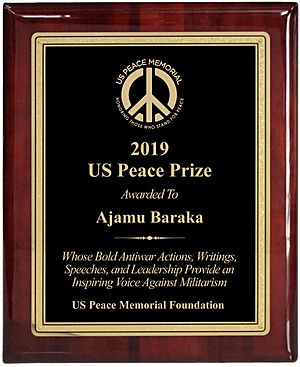Ajamu Baraka facts for kids
Quick facts for kids
Ajamu Baraka
|
|
|---|---|

Baraka in 2016
|
|
| Personal details | |
| Born |
Ajamu Sibeko Baraka
October 25, 1953 Chicago, Illinois, U.S. |
| Political party | Green |
| Education | City College of New York University of South Florida (BA) Clark Atlanta University (MA, PhD) |
| Military service | |
| Allegiance | |
| Branch/service | |
| Battles/wars | Vietnam War |
Ajamu Baraka (born October 25, 1953) is an American activist who works for human rights and social justice. In 2016, he was the Green Party candidate for Vice President of the United States. He ran alongside Jill Stein and they received over 1.4 million votes.
Today, Baraka is a national organizer and spokesperson for the Black Alliance for Peace. This group works for peace and justice for Black people around the world.
Contents
Early Life and Education
Ajamu Baraka was born in 1953 and grew up in Chicago, Illinois. He served in the U.S. Army during the Vietnam War. After his time in the army, he moved to the southern United States. There, he became involved in activism to end segregation, which was the separation of people based on race.
Baraka studied international relations and political science. He earned his bachelor's degree from the University of South Florida in 1982. He then received his master's and PhD degrees from Clark Atlanta University in 1987. He was inspired by the work of W. E. B. Du Bois, a famous writer and activist. Baraka also joined a movement to support people in Nicaragua. He later became a volunteer for Amnesty International, an organization that works to protect human rights.
Career and Activism
From 2004 to 2011, Baraka was the first executive director of the US Human Rights Network. This group connected many organizations and people who worked on human rights in the United States. He also served on the boards of several human rights groups, including Amnesty International and the Center for Constitutional Rights.
As a director at Amnesty International USA, Baraka helped create a campaign in 1998. This campaign aimed to show human rights problems in the United States. He also led Amnesty's program to end the death penalty.
Baraka has taught political science at universities. He also writes for Black Agenda Report and CounterPunch, which are online news and opinion sites.
Working for Human Rights
In 2008, Baraka worked with over 400 groups to create a report about human rights in the U.S. They felt the government's reports did not fully address issues like racial profiling and the impact of Hurricane Katrina.
In September 2016, Baraka protested against the Dakota Access Pipeline in North Dakota. He and Jill Stein were involved in a protest where Baraka spray-painted a word on a bulldozer. He described his action as a way to resist powerful corporations.
Views and Writings
Baraka's writings have appeared in various publications, including Black Agenda Report and Common Dreams.
Foreign Policy Views
Baraka has shared his thoughts on international events and U.S. foreign policy.
Middle East
In 2014, Baraka visited the Palestinian territories. He and other delegates called for an end to U.S. aid to Israel. They also supported the "Boycott, Divestment and Sanctions" (B.D.S.) movement, which aims to support Palestinian rights.
Baraka has also spoken about the U.S. involvement in Iraq. He called U.S. foreign policy in the Middle East "disastrous." He suggested that the U.S. played a part in the rise of groups like ISIS. He believed that control over natural resources, like gas pipelines, was a key reason for some conflicts in the region.
He also questioned the U.S. position on Syrian president Bashar al-Assad. Baraka believed that the idea of Assad being "illegitimate" was spread by Western media. In 2019, Baraka visited Syria to attend a trade union forum.
Ukraine
After events in Odesa, Ukraine, in 2014, Baraka expressed concern about the deaths of protestors. He also questioned the official story about the shootdown of Malaysia Airlines Flight 17 over Ukraine. He suggested there might be more to the story than what was reported in Western media.
Nigeria
Baraka has criticized calls for military action against the group Boko Haram in Nigeria. He argued that military action alone would not solve the problem. He also expressed skepticism about the official details of the Chibok schoolgirls kidnapping in 2014. He suggested that U.S. interest in the region might be related to oil fields and blocking Chinese influence.
Je suis Charlie Movement
In 2015, Baraka wrote about the "Je suis Charlie" movement that followed the Charlie Hebdo shooting in Paris. He criticized what he saw as a greater focus on this event compared to the 2015 Baga massacre in Nigeria, which had many more deaths. He also criticized what he called the "racist" and "Islamophobic" nature of some Charlie Hebdo publications.
Baraka also wrote an article titled "No 'Je Suis Charleston'?" after the Charleston church shooting. He pointed out that there wasn't a similar collective response like "Je suis Charlie" after the shooting at the Emanuel African Methodist Episcopal Church.
Critique of Public Figures
Baraka has shared his strong opinions about various public figures.
Barack Obama
Baraka strongly criticized President Barack Obama after the 2014 Ferguson unrest in Missouri. He believed Obama's response to the police killing of Michael Brown was not strong enough. Baraka argued that Obama showed "deference to white power." He also criticized the Obama administration for not attending a UN conference against racism in 2009. In 2016, Baraka described Obama as a "moral disaster" for African-American people.
Cornel West
In 2015, Baraka initially criticized writer and activist Cornel West for supporting Bernie Sanders. Baraka felt West was helping the Democratic Party too much. However, West later supported the Stein/Baraka campaign.
2016 U.S. Vice Presidential Campaign
On August 1, 2016, Jill Stein, the Green Party's presidential candidate, announced that Ajamu Baraka would be her running mate. They were officially nominated at the 2016 Green National Convention on August 6, 2016. In his speech, Baraka said he joined the Green Party to help build a movement for working people.
The Stein/Baraka ticket received over 1.4 million votes in the 2016 United States presidential election.
Awards and Recognition
In 1998, Ajamu Baraka was one of 300 human rights workers honored by UN Secretary General Kofi Annan. In 2001, the National Coalition to Abolish the Death Penalty named him "abolitionist of the year." This was for his work to end the death penalty in the United States.
In 2019, the US Peace Memorial Foundation gave Baraka The US Peace Prize. This award recognized his strong actions, writings, and speeches against war and militarism. In the same year, he also received the Serena Shim Award for his honest and fair journalism.
 | James Van Der Zee |
 | Alma Thomas |
 | Ellis Wilson |
 | Margaret Taylor-Burroughs |




